Mysore/Mysuru: Pontiff of Sri Vyasaraja Mutt, Sosale, Sri 1008 Sri Vidyashreeshateertha Swamiji has opined that ‘The onus of protecting Indian culture and Sanskrit language is on all.’
Sri Vidyashreeshateertha Swamiji was addressing a gathering of scholars and thinkers after inaugurating the two-day national seminar on ‘Kalidasa Kriti Samiksa’ organised jointly by Oriental Research Institute (ORI), University of Mysore and Sri Vyasateertha Samshodhana Pratisthanam, Krishnamurthypuram, Mysuru at Vijnana Bhavan Auditorium, Manasagangothri campus here on Tuesday (Feb.14).
“Nowadays, the fields of Science and Technology is getting more encouragement both at the Government and Global level. It is worth appreciative, but along with this Sanskrit literature that brought recognition at global level should also get due priority. The Government and the Universities should take steps to release at least an ounce of funds,” said Sri Swamiji.
Lauding the services of ORI for the gigantic task of conserving manuscripts of ancient education and also palm leaf manuscripts, the Swamiji regretted saying ‘Currently the number of readers for Indian epics and sourcing its essence are dwindling.’
“We should accept the contributions of Science and Technology, but it should be our key responsibility to give the whole gamut of ancient knowledge to future generation,” added Sri Vidyashreeshateertha Swamiji.
Kalidasa is a great poet without any match, as his literary works had the power to move the rigid and further energise the energy. The young scholars should involve in looking at Kalidasa’s poetries in a modern prospective and throw more light on them. There should be more number of takers for literature as the contribution of Mysuru to the culture is unique. In the Cultural Capital Mysuru, we should not just wait for organising seminars, but should gather at one place and organise sessions. The Vyasateertha Vidyapeetha is ready to provide minimum financial resources for the cause, assured the Swamiji.
Quoting epic works like Abhijnana Shakuntalam (Shakuntala) and Raghuvamsa of Mahakavi Kalidasa, Sri Vidyashreeshateertha Swamiji said ‘The epics of our land Ramayana and Mahabharata were the sources of inspiration for these works. The scholars and exponents were getting involved in more poetry works and Pampa, Ranna and Kumaravyasa stand first among them. In the present scenario, such a culture is on the wane and the literary works with a long lasting impact have also stopped from seeing the print.’
Amid the wave of globalisation, the Indians are reaching to a peculiar mindset. We are reaching the time of drifting away from our own culture. Hence we have to be aware and save our uniqueness, advised Sri Vidyashreeshateertha Swamiji.
Retired Superintending Archaeological Chemist of Archaeological Survey of India (ASI) S. Subbaraman was felicitated for being chosen for Padma Shri. Vidwan Dr. T. V. Sathyanarayana, ex-Deputy Director of ORI, delivered keynote address.
Veteran Sanskrit and Vedic scholars Dr. G. Krishna Prasad, Dr. Sharathchandra Swamy, Dr. T. V. Sathyanarayana, Prof. Tirumalacharya Kulkarni, Dr. Umakanth Bhat and Dr. H.V. Nagaraj Rao delivered lectures on the occasion.
Director of Sri Vyasateertha Samshodhana Pratisthanam C. H. Srinivasamurthy, Director of Oriental Research Institute Dr. D.P. Madhusudanacharya and others were present.
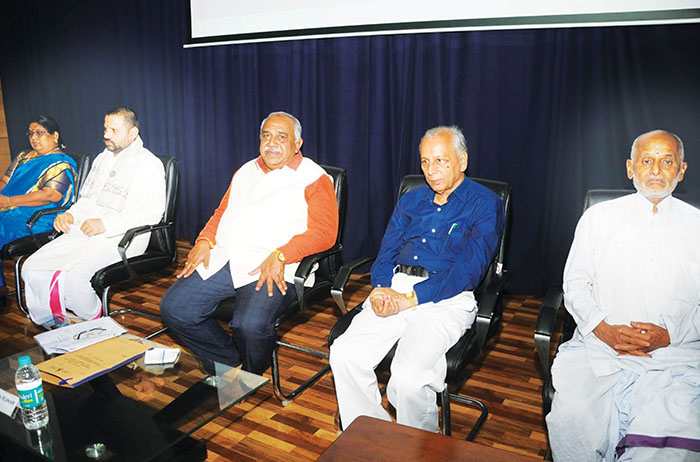
Valedictory of National Seminar on ‘Kalidasa Kriti Samiksa’
Delivering the valedictory address on Wednesday (Feb.15), veteran scholar Dr. H.V. Nagaraja Rao said ‘More than the number of books that come out of research, the scholarly study of the contents should get due recognition.’
Several researchers and scholars have made unique contributions to Indian tradition. Saayanacharya is the only scholar to have set the tone for all the four Vedas. Pradhan Venkappaiah, who had identified himself in the administrative committee during the reign of Tipu Sultan, has also made enormous contributions to literature. However, there is a need for more research on these achievers who remained in the dark.
Kalidasa stands top in the world as all the poets and litterateurs in the world have accepted his distinct style of poetries, selection of subject and relevant topics. So far, over 500 Ph.D theses and numerous books have been published on Kalidasa. All these hold mirror to the leading personality of Kalidasa along with his greatness, he said.
Former VC of University of Mysore Prof. G. Hemantha Kumar, Director of Sri Vyasateertha Samshodhana Pratisthanam C.H. Srinivasamurthy, Director of Oriental Research Institute (ORI) Dr. D. P. Madhusudanacharya, Deputy Director of ORI Dr. C. Parvathi, researchers Vamsi Krishna and Krishna A. Nagasampige and others were present.



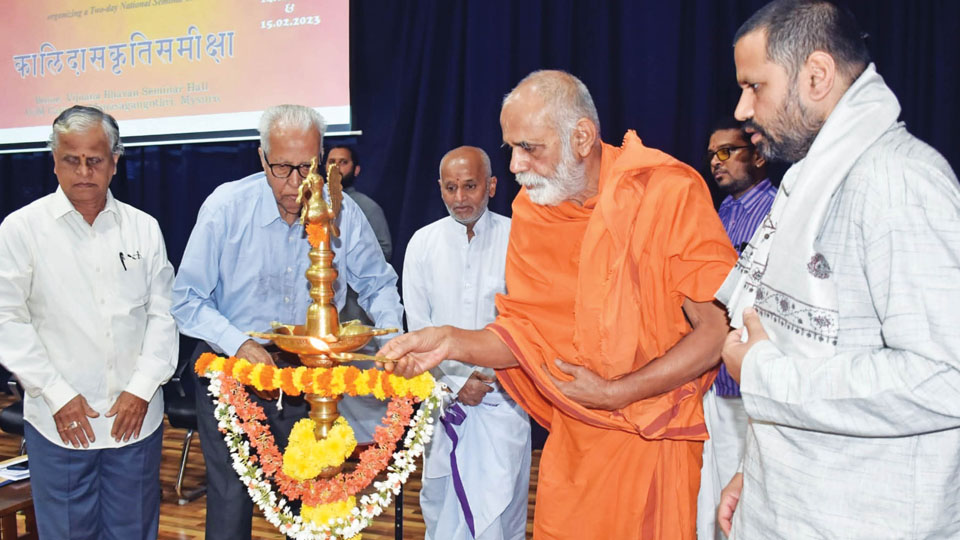
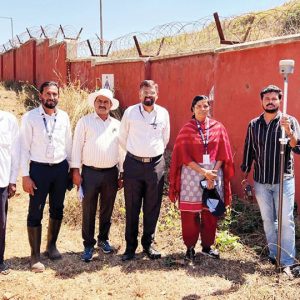
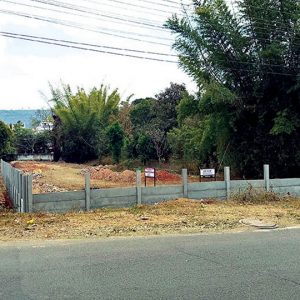
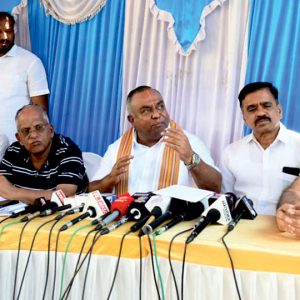
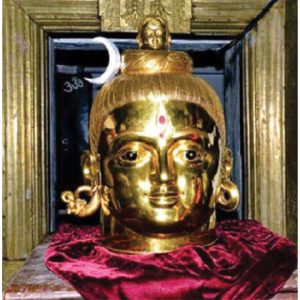
India lost the distinction of the citadel of Sanskrit literature and related Vedic and Upanishad studies decades ago. the institutions like the Bhandarkar Oriental Research Institute, Pune is trving to get college students interested in the above areas, more than the Oriental Research Institute in Mysore, which is basking in its past glory. Unlike the Bhandarkar Oriental Research Institute, Pune, this Oriental Reseach Institute never offered any internships or courses to college/university students, working themselves with a narrow vision, and hence, its importance has diminished, substantially from the famed days when Shama Shastri published first time the work of Kautilya, that is Chankya’s “Arthashashtra”.
Mysore, indeed S India has lost out in Sanskrit. Indeed the cluster of Sanskrit , Vedic and Upanishad studies these days are undertaken in a very few institutions in India.
India gripped with the c heap IT outsourced work, has all but displaced Sanskrit and Kalidasa in Indian school and college curriculum. The pty is there is no innovative contributions in India in respect of IT, science and technology. Only, the monotonous mundane cheap software coding chores for Western companies.
Even the Conference on Kalidasa in Ujjain, attracts very little attention. There is no Narendra Modi to herald the rich heritage of India in Sanskrit, Vedic and Upanishad studies, where India excelled and still does. But Modi is more interested in boasting about Tech India.
In comparison Technologically advanced Germany preserves its heritage of philosophy, as well as encouraging the studies of Sanskrit in its universities like the Heidelberg Universities. There are universities in other parts of Europe in Poland and Netherlands where Kalidasa is explored. The best thesis on Kalidasa’s “Megha Sandesha”, that I read was from a Dutch university! the head of Kalidasa study in the University of London’s School of Oriental and African Studies is a Polish woman academic!
The way I see it, while losing its heritage of Sanskrit in favour of IT and technologies, India will lose out on the latter too, without being excellent. What a great pity!!